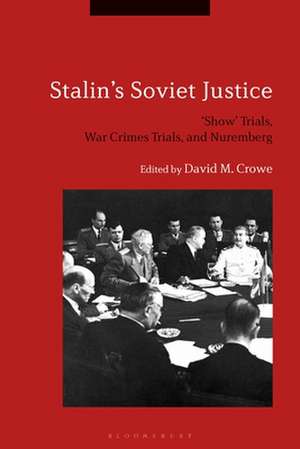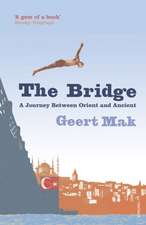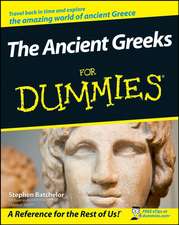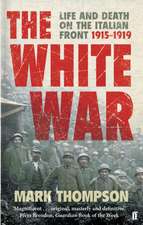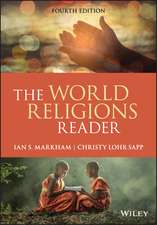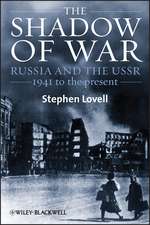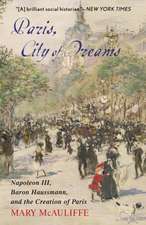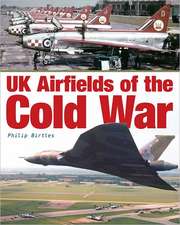Stalin's Soviet Justice: ‘Show’ Trials, War Crimes Trials, and Nuremberg
Editat de Prof. David M. Croween Limba Engleză Paperback – 23 dec 2020
| Toate formatele și edițiile | Preț | Express |
|---|---|---|
| Paperback (1) | 218.00 lei 6-8 săpt. | |
| Bloomsbury Publishing – 23 dec 2020 | 218.00 lei 6-8 săpt. | |
| Hardback (1) | 657.12 lei 6-8 săpt. | |
| Bloomsbury Publishing – 12 iun 2019 | 657.12 lei 6-8 săpt. |
Preț: 218.00 lei
Preț vechi: 275.07 lei
-21% Nou
Puncte Express: 327
Preț estimativ în valută:
41.72€ • 43.31$ • 34.79£
41.72€ • 43.31$ • 34.79£
Carte tipărită la comandă
Livrare economică 25 martie-08 aprilie
Preluare comenzi: 021 569.72.76
Specificații
ISBN-13: 9781350196919
ISBN-10: 1350196916
Pagini: 256
Dimensiuni: 156 x 234 x 17 mm
Greutate: 0.36 kg
Editura: Bloomsbury Publishing
Colecția Bloomsbury Academic
Locul publicării:London, United Kingdom
ISBN-10: 1350196916
Pagini: 256
Dimensiuni: 156 x 234 x 17 mm
Greutate: 0.36 kg
Editura: Bloomsbury Publishing
Colecția Bloomsbury Academic
Locul publicării:London, United Kingdom
Caracteristici
The first study to place the Soviet role in the London Conference and the Nuremberg IMT trial in an international context
Notă biografică
David M. Crowe is Presidential Fellow at Chapman University, USA and Professor Emeritus of History & Law at Elon University, USA. He is the author of numerous books, including War Crimes, Genocide, and Justice: A Global History (2013), The Holocaust: Roots, History, and Aftermath (2008), and Oskar Schindler: The Untold Story of His Life, Wartime Activities, and the True Story Behind the List (2004). David M. Crowe's books have been translated into six languages.
Cuprins
Introduction, David M. Crowe (Elon University, USA)1. Late Imperial and Soviet 'Show' Trials, 1878-1938, David M. Crowe (Elon University, USA) 2. Traitors or War Criminals: Collaboration on Trial in Soviet Courts in the 1940s, Alexander V. Prusin (New Mexico Institute of Mining and Technology, USA)3. 'Nikto ne zabyt': The Politicization of Soviet War Dead, Thomas Earl Porter (North Carolina A&T State University, USA)4. The Human Face of Soviet Justice: Aron Trainin and the Origins of the Soviet Doctrine of International Criminal Law, Valentyna Polunina (Heidelberg University, Germany)5. 'May Justice be Done!': The Soviet Union and the London Conference (1945), Irina Schulmeister-André (Independent Scholar, Germany)6. The Soviet Union at the Palace of Justice: Law, Intrigue, and International Rivalry in the Nuremberg Trials, Francine Hirsch (University of Wisconsin-Madison, USA)7. Soviet Journalists at Nuremberg: Establishing the Soviet War Narrative, Jeremy Hicks (Queen Mary University of London, UK)8. From Geneva to Nuremberg to New York: Andrei Vyshinsky, Raphaël Lemkin, and the Struggle to Outlaw Revolutionary Violence, State Terror, and Genocide, Douglas Irvin-Erickson (George Mason University, USA)Select BibliographyIndex
Recenzii
The volume, especially the chapters by Irina Schulmeister-André/David M. Crowe, Francine Hirsch, and Jeremy Hicks excel in highlighting these complex interdependencies between power politics, legal positions, court proceedings, and official reconstructions of the past.
[It] rightfully re-orients the Soviet legal system and its leading minds into the center of the creation of post-World War II international law.
This is no dry account of disputes over points of law; here, we learn of the conflicts, disappointments, and victories of real people that takes us beyond the stereotypes of the lawyers as puppets of the Kremlin or journalists churning out propaganda. The result is an intellectually-satisfying account both of the familiar story of the failed attempt of the USSR to use the Nuremburg trials to control the narrative of its role in the Second World War and of the lasting contribution that Soviet legal scholarship made to the development of international law.
Stalin's Soviet Justice makes a significant contribution to our understanding of the theory and practice of criminal justice and political repression in the USSR, shedding valuable light on the important Soviet contributions to the development of international criminal law and legal institutions after World War II.
[It] rightfully re-orients the Soviet legal system and its leading minds into the center of the creation of post-World War II international law.
This is no dry account of disputes over points of law; here, we learn of the conflicts, disappointments, and victories of real people that takes us beyond the stereotypes of the lawyers as puppets of the Kremlin or journalists churning out propaganda. The result is an intellectually-satisfying account both of the familiar story of the failed attempt of the USSR to use the Nuremburg trials to control the narrative of its role in the Second World War and of the lasting contribution that Soviet legal scholarship made to the development of international law.
Stalin's Soviet Justice makes a significant contribution to our understanding of the theory and practice of criminal justice and political repression in the USSR, shedding valuable light on the important Soviet contributions to the development of international criminal law and legal institutions after World War II.
